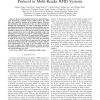2084 search results - page 309 / 417 » Proving Time Bounds for Randomized Distributed Algorithms |
102
click to vote
ALT
1999
Springer
15 years 6 months ago
1999
Springer
We introduce a new model for learning in the presence of noise, which we call the Nasty Noise model. This model generalizes previously considered models of learning with noise. Th...
110
click to vote
ALGORITHMICA
2004
15 years 2 months ago
2004
We consider the problem of scheduling dynamically arriving jobs in a non-clairvoyant setting, that is, when the size of a job in remains unknown until the job finishes execution. ...
141
Voted
ICNP
2009
IEEE
15 years 6 days ago
2009
IEEE
Abstract--Recent technological advances have motivated largescale deployment of RFID systems. RFID readers are often static and carefully deployed in a planned manner. However, the...
131
Voted
SIROCCO
2007
15 years 3 months ago
2007
We consider the problem of periodic exploration of all nodes in undirected graphs by using a
nite state automaton called later a robot. The robot, using a constant number of state...
144
Voted
SODA
2003
ACM
15 years 3 months ago
2003
ACM
The natural relaxation for the Group Steiner Tree problem, as well as for its generalization, the Directed Steiner Tree problem, is a flow-based linear programming relaxation. We...

